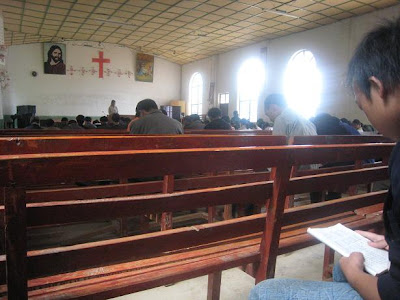
We went to Shilin a few days ago, where I spent hours walking through rock formations that radiated a cathedral-like reverence. Although the core of the park is tourist-ridden, my hike around the perimeter trails was undisturbed, allowing me to wind in and out of the rocks with a feeling similar to walking through the red slot canyons of Utah.

There's a story about how the Shilin, the stone forest, came to be as it is. It begins with two lovers, Yi people, happy, with words of marriage tentatively hiding behind their cheeks. And this was all a long time ago--an early rendition on the great theme of love, the kind that comes in deep grooves, like the bark of certain old trees. So now enter the landlord, an older man, bald, hunchback, sure, and there's greed there, a powerful greed. Every day he sees her, you know the one, with steps as light as grasshopper wings, movements brisk like a leaf in the wind, and looking at her is like feeling the amber breath of sunlight after heavy rain. And the landlord, he licks his lips, he thinks, ah, he thinks, she, mine. She, that, yes, that's mine.
Time yields, all but collapses to the events that follow. And look, quick now or you’ll miss it, here comes the wedding announcement, here comes the parents blessing because the landlord is, after all, a landlord! And then the night before the great misery, two lovers kiss their palms, and with palms kiss the doorway wood that almost says no, no, this is your home, no. And as newborn ghosts, they disappear into the forest.

The landlord's face curdles with rage. MINE! he screams where palms had lingered the night before. MINE! he screams at the men of the Yi village, throwing off his newly tailored wedding cloak. MINE! he screams, riding his horse with the men of the town behind him, because the landlord is, after all, a landlord, and she is, after all, his wife-to-be. Be it said that a landlord is no stranger to ownership.

They are caught in a grove of limber pines, where the story again resembles a rendition of a great theme, an archetype of severance. And the landlord declares theifhood, and a punishment of death, and a wedding soon to follow. And now the two halves hold their hands together so tightly, condensing each scrap and swatch of their love into the tiniest ball, gripped like a heart between the ribs of their fingers. When they are pulled apart, it has taken twenty-three men. When they are pulled apart, the pine trees shudder. When they are pulled apart, the sun dims, the soil stiffens, and a great wind gouges its way through the grove. The men are pressed to the ground, hands protecting their eyes from the clawing of an invisible beast. And later, much later, when eyes open, cautiously, they open to a forest of stone, with two stone pillars standing in the middle of it all.
There's another story about Shilin, about how the limestone rocks had eroded over thousands of years by the acidic combination of water and carbon dioxide, creating the strange formations seen today.
Science, you're great and all, but sometimes... I mean, c'mon.
-S
p.s. Again, I'm way behind in posts. Workin' on it.














